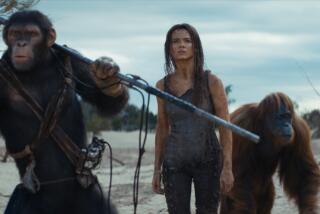Simians Have Rights Too, Activists Insist : Apes: United Nations is urged to adopt a declaration that would protect gorillas, orangutans and chimpanzees and prohibit torture, use in circuses and other entertainment.
- Share via
SYDNEY, Australia — Does the world need a Universal Declaration of Simian Rights?
Some scholars believe so--at least for the great apes, the closest evolutionary relatives of humans.
They want the United Nations and its members to adopt a declaration that would protect gorillas, orangutans and chimpanzees and prohibit torture. In their view, Homo sapiens also is an ape, and should accord fellow apes the same rights he demands for himself.
Australian philosopher Peter Singer and Paola Cavalieri of Italy, a champion of animal rights, are co-editors of a book of essays by 39 like-minded philosophers, lawyers and scientists from around the world.
“The Great Ape Project: Equality Beyond Humanity” was published in Britain in June and will be available in the United States in January. Its contributors seek bans on the hunting and capture of apes and on their use in circuses or other entertainment.
Apes raised in zoos and unable to fend for themselves in the wild should be kept in open, stimulating settings, not in cages, the advocates propose. Scientific experiments and tests that harm apes would be defined as torture and prohibited.
“The great apes are intelligent mammals with emotional and social lives,” said Singer, a professor at Monash University in Melbourne. “In many ways, they are like us.”
Great apes should be part of a “moral community of equals” with humans, the editors contend.
Essays point to similarities in DNA, body structure and behavior. They cite scientific research showing that apes have communication and logic skills equal to those of small children.
“Some characteristics (of apes) are indistinguishable from our own,” Singer said in a telephone interview. He said other intelligent species, such as whales and dolphins, also might eventually have a case for special rights.
Singer sees the argument for apes as a logical progression of evolutionary theories begun in the last century by Charles Darwin. Darwin’s concept that humans are descended from apes is still rejected by some Christians and followers of other faiths.
By going even farther than the controversial British naturalist, the Great Ape Project is likely to meet opposition even from theologians who accept the scientific plausibility of evolution.
“The argument is absurd,” said Father Brian Lucas, a spokesman in Sydney for the Roman Catholic Church.
“Rights are inherent and not conferred by society. The difference between apes and humans is that we have self-consciousness. They don’t. We need to respect God’s creation, but animals are not our equals.”
Several of the book’s contributors disagree.
“We are not, after all, quite as different from the rest of the animal kingdom as we used to think,” wrote Jane Goodall, a noted British scientist who has spent more than 30 years observing wild chimpanzees in Tanzania.
“The line dividing ‘man’ from ‘beast’ has become increasing blurred. The chimpanzees, and other great apes, form a living bridge between ‘us’ and ‘them.’ ”
Singer acknowledges that millions of humans continue to live and die in poverty and persecution despite the pronouncements on their rights, including the Universal Declaration of Human Rights of the United Nations.
“Denial of the basic rights of a particular species will not . . . assist the world’s poor and oppressed to win their just struggles,” as the book’s introduction puts it.
“It is a matter of ethics,” Singer said.
More to Read
Sign up for Essential California
The most important California stories and recommendations in your inbox every morning.
You may occasionally receive promotional content from the Los Angeles Times.













